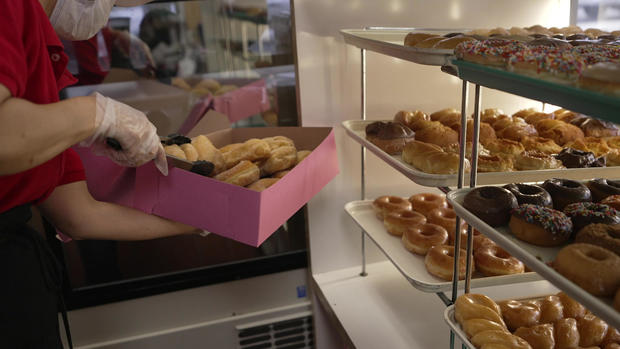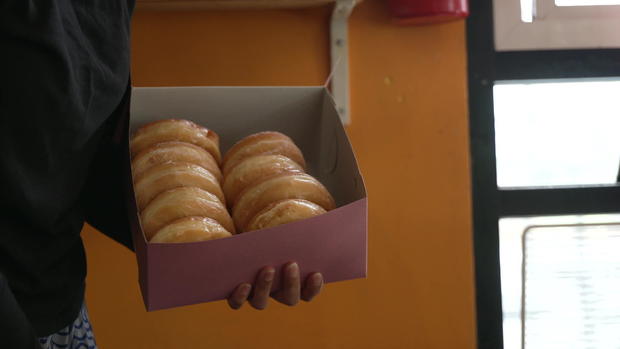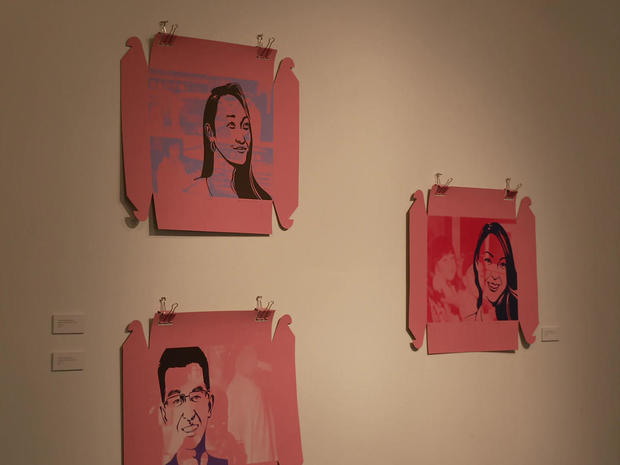How doughnut shops became a sweet American Dream
The mom-and-pop doughnut stores that dot California's strip malls carry mostly the same mouth-watering doughy delights. But beyond the rows of glazed, chocolate and sprinkles lies a different kind of richness, in the stories of the Americans behind the counter.
Roughly 80% of doughnut shops in southern California – that's well over a thousand – are owned by Cambodian refugee families. They arrived in America in the late 1970s and early '80s seeking safety as the Communist Khmer Rouge committed genocide in Cambodia's killing fields. Millions were executed or disappeared.
Many who escaped settled in California, and found work in doughnut shops.
"We immigrated right after the genocide," said Teresa Ngo, who owns Blinkie's Donuts in Woodland Hills. Her family has owned doughnut stores since the 1980s. "At the beginning, once you get here, you don't speak the language, and you have family that offers you a job. And next thing you know, they've been doing it for their whole life, and sometimes a few generations at a time."
Erin Curtis, an L.A. historian with the Lucas Museum of Narrative Art in Los Angeles, said that refugees weren't offered many resources, and had to figure out how they could support each other. "California has had a long history of doughnut culture," she said. "And it's become even more famous, I would argue, in the last 40 years or so, and that's really due to Cambodian refugees who kind of came in and expanded the doughnut culture here in Southern California very greatly."
Correspondent Elaine Quijano asked, "It's fair to say it's part of American culture then?"
"Yeah, absolutely."
A culture which now includes the pink doughnut box. Decades ago, Cambodian store owners bypassed expensive white boxes for cheaper pink boxes, which fit a dozen doughnuts perfectly. The move not only saved thousands of dollars; it also created an icon of sweetness.
"I probably learned how to fold a pink doughnut box before I learned my ABCs," said Dorothy Chow, who today manages a doughnut supply company. The daughter of Cambodian refugees, she grew up working in several of her parents' stores, and considers herself a "doughnut kid."
"There were some days that I worked maybe 12-, 13-, 14-hour days," said Chow. "But then, now as I'm older, I can look back at it with pride. Like, I am a part of something bigger. I am part of this whole journey that our parents have been on. They came here with nothing. They needed all the help that they could with the doughnut shop. And we were there to help and support them whenever we can."
A story which is now being unboxed. Phung Hyunh is a Cambodian-American artist who came to America as a refugee. In her exhibit, "Donut (W)hole," at Self Help Graphics & Art in Los Angeles, she uses a pink doughnut box instead of a white canvas to capture a taste of the Cambodian-American refugee experience.
"That common shared experience of the doughnut is very American," she said. "Underneath the sweet of the doughnut is actually inter-generational trauma and pain."
Hyunh's art focuses in large part on the second generation. She juxtaposes childhood images of "doughnut kids" with the portraits of the adults they've become. "It's only this generation born in the United States to tell their parents, 'Look, we wanna honor you. You never had the time to even think about what you've been through. And we want to take this time to honor your story because you didn't have the time to write about it,'" Hyunh said.
One of her portraits: Dorothy Chow.
When asked to described seeing her portrait on a pink doughnut box, Chow replied, "I had a sense of pride. I think maybe for the first time I felt like growing up in America and maybe making sacrifices I did as a child was finally being seen."
Now, as an adult, Chow herself sees things differently – like the pink boxes she once folded as a little girl. "These doughnut boxes are an example of resilience and a representation of the refugee experience here in America," she said.
For more info:
- Blinkie's Donuts, Woodland Hills, Calif.
- Artist Phung Hyunh
- Exhibition: "Donut (W)hole" by Phung Huynh, at Self Help Graphics & Art, Los Angeles (through May 27)
- B&H Bakery Distributors, Hayward, Calif.
- Lucas Museum of Narrative Art, Los Angeles
Story produced by Sharaf Mowjood. Editor: Remington Korper.






